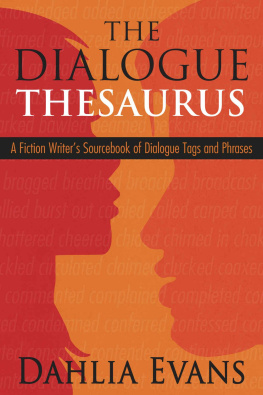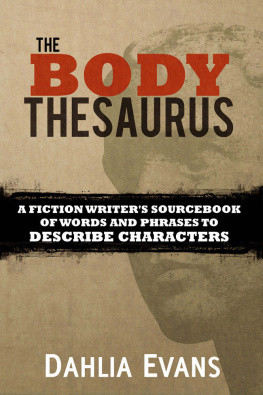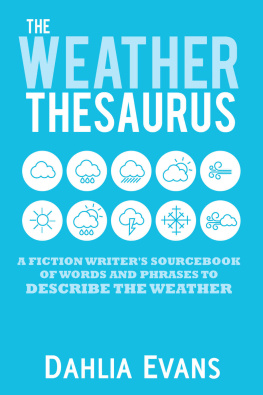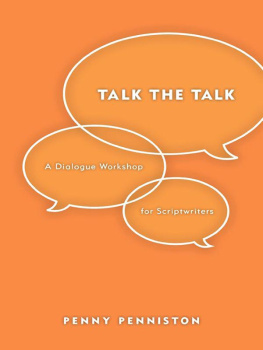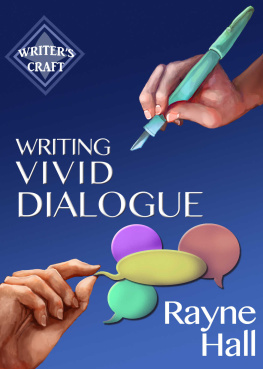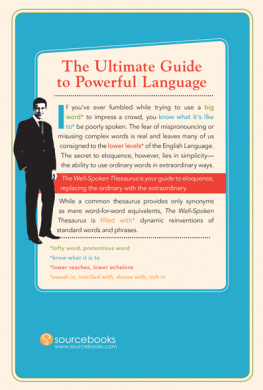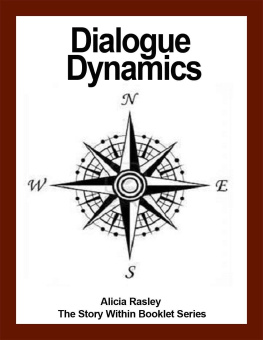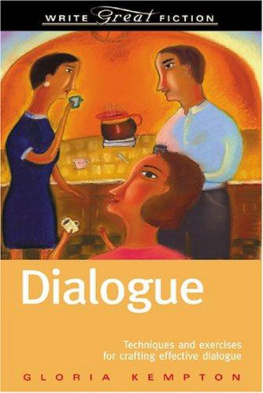Dahlia Evans - The Dialogue Thesaurus: A Fiction Writer’s Sourcebook of Dialogue Tags and Phrases
Here you can read online Dahlia Evans - The Dialogue Thesaurus: A Fiction Writer’s Sourcebook of Dialogue Tags and Phrases full text of the book (entire story) in english for free. Download pdf and epub, get meaning, cover and reviews about this ebook. year: 0, genre: Detective and thriller. Description of the work, (preface) as well as reviews are available. Best literature library LitArk.com created for fans of good reading and offers a wide selection of genres:
Romance novel
Science fiction
Adventure
Detective
Science
History
Home and family
Prose
Art
Politics
Computer
Non-fiction
Religion
Business
Children
Humor
Choose a favorite category and find really read worthwhile books. Enjoy immersion in the world of imagination, feel the emotions of the characters or learn something new for yourself, make an fascinating discovery.
- Book:The Dialogue Thesaurus: A Fiction Writer’s Sourcebook of Dialogue Tags and Phrases
- Author:
- Genre:
- Year:0
- Rating:5 / 5
- Favourites:Add to favourites
- Your mark:
- 100
- 1
- 2
- 3
- 4
- 5
The Dialogue Thesaurus: A Fiction Writer’s Sourcebook of Dialogue Tags and Phrases: summary, description and annotation
We offer to read an annotation, description, summary or preface (depends on what the author of the book "The Dialogue Thesaurus: A Fiction Writer’s Sourcebook of Dialogue Tags and Phrases" wrote himself). If you haven't found the necessary information about the book — write in the comments, we will try to find it.
Dahlia Evans: author's other books
Who wrote The Dialogue Thesaurus: A Fiction Writer’s Sourcebook of Dialogue Tags and Phrases? Find out the surname, the name of the author of the book and a list of all author's works by series.
The Dialogue Thesaurus: A Fiction Writer’s Sourcebook of Dialogue Tags and Phrases — read online for free the complete book (whole text) full work
Below is the text of the book, divided by pages. System saving the place of the last page read, allows you to conveniently read the book "The Dialogue Thesaurus: A Fiction Writer’s Sourcebook of Dialogue Tags and Phrases" online for free, without having to search again every time where you left off. Put a bookmark, and you can go to the page where you finished reading at any time.
Font size:
Interval:
Bookmark:
.
.
.
Published By:
Satin Publishing
Copyright 2015 by Dahlia Evans. All Rights Reserved.
No part of this publication may be replicated, redistributed, or given away in any form without the prior written consent of the publisher.
"This invaluable resource is a must have for any aspiring romance writer!"
In the world of romance writing, one of the most important components in an author's repertoire is their use of descriptive words and phrases. This aspect of romance writing is so often neglected, usually with disastrous results; a novel that reads like a badly written script.
Fortunately, there's now a way for any writer, regardless of their experience, to get a huge head-start writing in this profitable genre. It's a secret resource that romance writers don't want you to know about!
Dahlia Evans has compiled a romance writing thesaurus unlike anything ever published. This reference book is filled to the brim with words and phrases gathered from hundreds of bestselling romance novels. Using this book you will be able to describe intimate encounters of every kind without breaking a sweat.
Inside You'll Discover:
* 8,500 words and phrases sorted into 37 categories.
* Thousands of words you can use to describe each part of the body.
* Words that describe each of the five senses; taste, touch, sight, sound, smell.
* Words to describe feelings and emotions.
* Words that describe facial expressions.
* Hundreds of words to describe intimacy.
Thinking Like A Romance Writer is the culmination of hundreds of hours of research and is a book destined to become a classic in the field of romance writing instruction.
The idea for this book came about while I was analyzing the structure of various novels. As part of the exercise, I decided to see if I could somehow catalogue the words and phrases that surround fictional dialogue. It wasn't long before I discovered a number of patterns. This was a eureka moment in my writing career.
I then asked myself a question: "should I keep this information to myself? Or instead, share it with the writing community." Knowing how much this information would help budding and professional writers alike, I decided to share it by writing this book.
For me, this thesaurus is a book I didn't realize I needed. But now that I have it sitting in front of me, I can't imagine writing fictional dialogue without it. I no longer need to rack my brain to come up with fitting dialogue tags and phrases. Now, I just open this book and away I go! I hope you will have a similar experience.
The book is broken up into four parts. They are: dialogue and action tags; dialogue adverbs; feelings, emotions, and internal dialogue; body language and movement.
In the first three parts all words are sorted in alphabetical order, as well as grouped by category. These categories include: emotion; dynamics; sound; physical state; manner.
Part Three also includes the following two categories: modifying words; internal dialogue and thought tags.
Entries for parts One to Three are separated by a semicolon.
Part Four is structured slightly differently. Entries are sorted by physical feature; with each entry separated by a line break.
Example sentences ('USAGE EXAMPLES') are used at the end of each category to give the reader an idea of how to use an entry in a dialogue sequence. Each entry is italicized.
1) I'm sick of using 'he said' and 'she said' so often. I want some variety!
In this case, go to PART 1 Dialogue and Action Tags and select a tag; either by alphabet, or by category. If you know what type of emotion you wish to express and that emotion is included select a word that fits your dialogue.
2) I want to use an adverb to add a little spice.
Adverbs, if used sparingly, can add a spark to your dialogue writing. No matter what any critic says, adverbs will always have a place in fiction. Just remember: quality over quantity. PART 2 Dialogue Adverbs includes pretty much every usable adverb that can be combined with 'said' (or other dialogue tags).
3) My dialogue is ambiguous, so I want to explain what the character is feeling.
In this case, go to PART 3 Feelings, Emotions, and Internal Dialogue. Here you will find every major feeling and emotion word out there. Using the Modifying Words category will give you some ideas when structuring your sentences.
If you want to write internal dialogue then go to the category: Internal Dialogue and Thought Tags for a great selection of tags.
4) I want to show the character's actions to help the reader visualize the scene.
PART 4 Body Language and Movement gives you everything you need to describe a character's body language and movement. These phrases will bring your dialogue to life!
While you can use these phrases as they are, it is my hope that you will also use them as inspiration to come up with your own variations. Combine, rearrange, and alter 'til your heart's content.
I want to thank you for your investment. I hope this thesaurus aids you in all your future writing projects.
Warm Wishes,
Dahlia Evans
abjured; accused; acknowledged; added; addressed; admitted; admonished; advertised; advised; advocated; affirmed; agonized; agreed; alleged; alluded; announced; answered; apologized; appealed; approved; argued; arranged; articulated; asked; assented; asserted; asseverated; assumed; assured; attested; averred; avowed.
babbled; baited; bantered; bargained; barked; bawled; beamed; beckoned; began; begged; belittled; bellowed; berated; beseeched; bit out; blasted; blazed; bleated; blew up; blubbered; blurted; blurted out; blustered; boasted; boomed; bossed; bragged; breathed; broached; broadcast; broke in; bubbled; bugged; bullied; burst out.
cackled; cajoled; calculated; called; called out; caroled; carped; cautioned; censured; challenged; chanted; charged; chatted; chattered; cheered; chided; chimed in; chipped in; choked; choked out; chortled; chorused; chuckled; circulated; cited; claimed; clucked; coaxed; comforted; commanded; commented; communicated; complained; completed; complimented; conceded; concluded; concurred; condemned; condescended; conferred; confessed; confided; confirmed; confuted; congratulated; consented; consoled; contended; contested; continued; contradicted; contributed; convinced; cooed; corrected; coughed; counseled; countered; crabbed; cracked; craved; cried; cried out; criticized; croaked; crooned; cross-examined; crowed; cursed.
dared; debated; decided; declared; decreed; defended; defied (her/him); delivered; demanded; demurred; denied; denoted; denounced; described; dictated; dinned; directed; disagreed; disclaimed; disclosed; disposed; disrupted; disseminated; divulged; doted; doubted; drawled; droned.
Font size:
Interval:
Bookmark:
Similar books «The Dialogue Thesaurus: A Fiction Writer’s Sourcebook of Dialogue Tags and Phrases»
Look at similar books to The Dialogue Thesaurus: A Fiction Writer’s Sourcebook of Dialogue Tags and Phrases. We have selected literature similar in name and meaning in the hope of providing readers with more options to find new, interesting, not yet read works.
Discussion, reviews of the book The Dialogue Thesaurus: A Fiction Writer’s Sourcebook of Dialogue Tags and Phrases and just readers' own opinions. Leave your comments, write what you think about the work, its meaning or the main characters. Specify what exactly you liked and what you didn't like, and why you think so.

